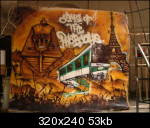A few months ago a Prof. of Chemistry friend at a major Univ. in France expressed scepticism concerning the CCS - carbon capture and sequestration, the geological and geoengineering response to increases in CO2 a well documented GWG-global warming gas. (Increases roughly since James Watts invention of the steam engine Cf. David JC Mackay's book "Without Hot Air" "David JC Mackay's book "Without Hot Air") my chemist friend's objection concerned dangers of stored carbon escape since CO2 is not in a chemically combined and imprisoned form. Of course the physicists, and geological engineers consider that suitably stable, deep sites may be found whereby high pressures in deep wells is sufficient to maintain the CO2 in the liquid, or pseudo liquid (super-saturated) state to remain simple. More audacious consider that by avoiding sequestration in valleys especially inhabited valley even if there is gas escape there will be no serious consequences.
Whatever, I am extremely pleased to find this Danish work via my blog listed RSS feed whereby CO2 mitigation is suggested by physical-chemistry methods which should come closer to meeting the approval of my chemistry friend.
The Danish consider what they feel are six important CO2 transformations namely:
1. chemical transformations,
2. photochemical reductions,
3. chemical and electrochemical reductions,
4. biological conversions,
5. reforming and inorganic transformations.
In addition, the vast research area of carbon capture and storage is reviewed briefly.
Such reviews should help suggest and channel themes of research and thus improve the overall mastering of our incredible capacity to generate CO2 in energy production,industry and transportation.
REFERENCE TO FULL PAPER FREELY AVAILABLE.
en référence à : Energy & Environmental Science Articles (afficher sur Google Sidewiki)







No comments:
Post a Comment